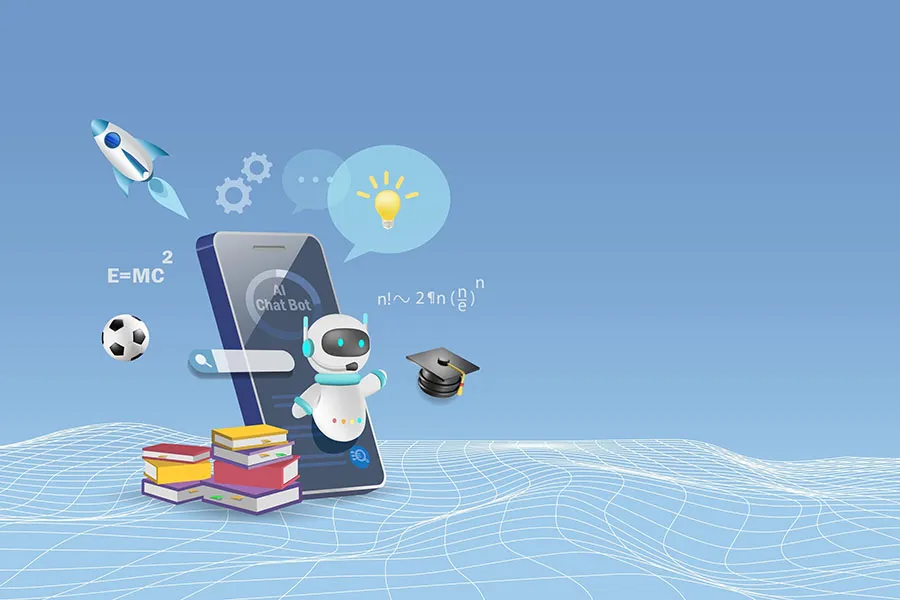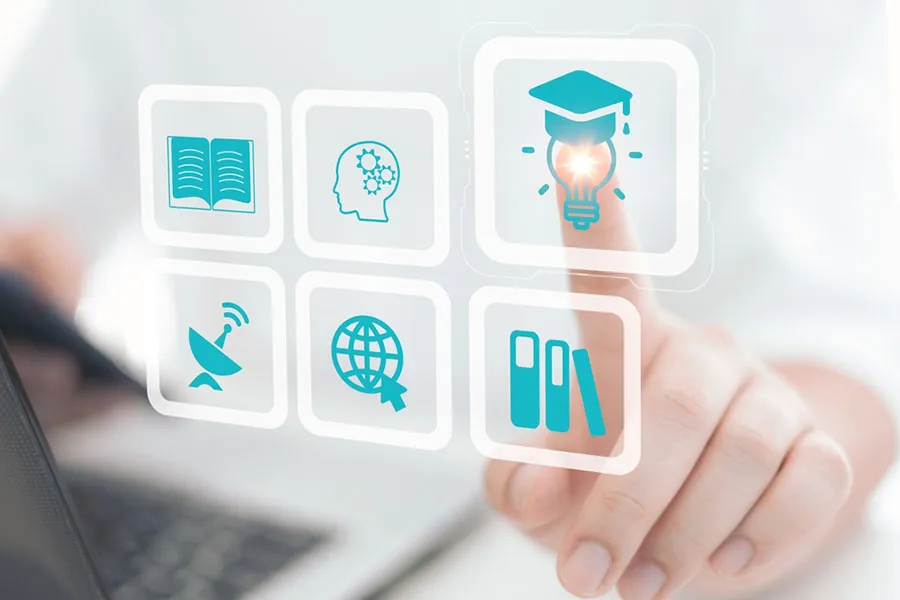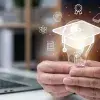Educational innovation through digital resources, with the cross-cutting use of artificial intelligence (AI) and other technologies, continues to advance at Tecnológico de Monterrey.
This is shown in the 2024 Report on Educational Innovation and Digital Education at the Tecnológico de Monterrey, which reports that 43% of professional level students took at least one subject in a digital format with AI support.
In addition, there was a 60% increase during 2024 in the design of educational experiences that transformed one or more elements of the teaching and learning process for students.
Last year, 606 innovation initiatives were reported in 322 learning units, compared to 201 in 2023.
In 2024, 1,079 teachers designed or adopted an innovative experience that impacted more than 75,000 Tec de Monterrey students.

“Today, we can confirm that the incorporation of digital experiences in our academic programs has revolutionized the teaching-learning process.
“At the Tec, education is no longer a one-dimensional process. It’s an integral ecosystem in which students participate, explore, and build their own knowledge,” says Beatriz Palacios, Director of Educational Innovation and Digital Learning at the Tec.
She mentions that to achieve this they have integrated digital tools and advanced pedagogical techniques, including the integration of AI, Adaptive Learning methodologies, co-curricular credentials, augmented reality, simulation scenarios, among other technological resources.
She says that the role of teachers is a priority in this evolution:
“The role of the teacher has been transformed from transmitter of knowledge to facilitator and mentor, guiding students in the construction of knowledge within a technological environment.”
“At the Tec, education is no longer a one-dimensional process. It’s an integral ecosystem.” – Beatriz Palacios
Transforming classroom practice
The document shows the actions of professors from each Tec de Monterrey School regarding educational innovation and digitalization and the most notable teaching-learning experiences.
“For our institution, educational innovation is the transformation of classroom practice. It’s not about introducing new types of technologies into the administrative areas or in the processes supporting teachers.
“It’s the transformation of what directly impacts the teaching-learning process, ensuring that our students gain value,” says Beatriz Palacios.
Some of the actions and data included in the document reference the practices of each of the Tec’s six schools, involving the participation of 1,079 professors participated. Some of these include:

- School of Architecture, Art, and Design
The School of Architecture, Art, and Design applied emerging technologies into its projects, promoting critical reflection on social and environmental contexts.
A total of 52 projects were registered across 34 learning units. More than 80 teachers participated, impacting 2,300 students and subjects.
Implemented projects:
- Archie, the APA bot for architects: this is an assistant designed to facilitate the application of APA standards in figures and academic references.
- Advanced architecture for transportation stations: integration of advanced technologies to develop an architectural proposal for Nuevo Leon’s Ministry of Infrastructure.
- Sketch IAAR: this combines artificial intelligence and augmented reality to transform the design process of sensory spaces.
- Art games: this focuses on the creation of interactive video games that challenge traditional conventions by integrating art.
-School of Social Sciences and Government
According to the report, the School of Social Sciences and Government aims to transform reality through innovation, knowledge, and social and political commitment.
In this school, 61 projects and 17 training units were registered, with the participation of 93 professors, reaching more than 9,000 students and subjects.
Applied projects:
- Anti-corruption course: this is designed for students to explore causes, effects, and solutions to corruption in different contexts.
- General education learning unit in law: this is offered to students regardless of their major, aiming to provide essential legal knowledge for everyday life.
- Diplomatic simulation: in collaboration with the Universidad San Francisco de Quito, students participated in a diplomatic simulation designed to address and propose solutions between 2 states.
-School of Humanities and Education
The School of Humanities and Education developed various educational innovation strategies related to students’ experiences to strengthen their formative competencies.
There were 87 projects, 37 learning units, and 79 professors participated, impacting 9,114 students and subjects.
Completed projects:
- Innovation in experiential processes: the number of courses associated with workshops and activities held at the International Book Fair was increased to promote reading skills.
- New technologies and pedagogical approaches to transform the teaching-learning process: the music production course was designed with advanced technology.
- Use of ChatGPT: used by students to develop argumentative essays, serving as written evidence in developing formative sub-competencies.
- Possible futures with AI: students wrote science fiction stories using generative artificial intelligence tools.
-School of Engineering and Sciences
Among the main initiatives developed by the School of Engineering and Science in 2024 was the use of Artificial Intelligence in various areas.
In this school, 219 projects and 127 training units were registered, with the participation of more than 350 professors and impacting 19,000 students and subjects.
Completed projects:
- AI in the teaching of supply chain management: AI helped determine demand forecasting for periods required by the user, based on historical data.
- AI in integrated process design and in bio-businesses: Chat GPT was used to investigate, analyze, and evaluate processes in the context of sustainability.
- AI as a learning tutor: the GenTutor initiative was designed with an intelligent tutoring system, using generative AI in topics such as object-oriented programming.
-School of Medicine and Health Sciences
The strategy of the School of Medicine and Health Sciences is focused on supporting the teaching-learning process by integrating cutting-edge technology and innovative pedagogical methodologies.
There were 35 projects and 16 learning units recorded, with the participation of 46 teachers and impacting 5,100 students and subjects.
Projects:
- AI implementation: generation of pediatric and multidisciplinary clinical medical simulation scenarios.
- Virtual patients in respiratory system pathophysiology: simulation with virtual patients for the development of disciplinary competences.
- Emotions, self-regulation, and Lego Serious Play: self-awareness, empathy, and recognition of tools for regulating emotions were promoted.
-School of Business
According to the directors of the School of Business, the teaching-learning process and the use of artificial intelligence, virtual reality, and the evaluation and feedback of competencies have been key to improving education.
There were 106 projects and 68 training units registered, with 370 teachers participating and impacting 12,500 students and subjects.
Completed projects:
- Explor-AR Geo: use of a mobile app that integrates digital tools and technologies enabling learning activities in a mixed reality experience.
- Green Flags: through hyper-personalized learning with artificial intelligence and virtual reality, students were able to apply theoretical knowledge in real world situations.
- My digital business world: this served to integrate advanced virtual reality and artificial intelligence technologies into the teaching-learning process.
“It’s a record to have more and better digital learning experiences.” – Beatriz Palacios
Consolidating educational innovation
The document presents the implementation of the various Tec strategies in educational innovation and digital learning, detailing the impact of the actions, the methods employed, and the resources utilized.
“It’s a record to see the efforts that, as an institution, we’re making in order to have more and better digital learning experiences.
“It’s about having visibility of what is being done, by both teachers and many areas that drive innovation and digital education,” Palacios adds.
According to Maribel Reyes, Director of Digital Education, it focuses on two areas.
“Mainly, it contains everything related to advances in educational innovation throughout the institution.
“It also highlights the progress we’ve made in digital education and how we’ve evolved in incorporating it into curricular structures, making it a part of the syllabuses.”
The report aims to make the culture of innovation visible from the classroom.
Patricia Aldape, Director of Learning Experience Innovation, notes that it documents the impact of various academic strategies and the Tec’s evolution towards an inclusive, accessible, and effective culture for its students.
“This report allows us to see what we’re doing in educational innovation. Each school reports its projects, and we see the application of new methodologies and how they’re applied.
“It’s served to transform and improve educational experiences, to promote this type of project, and to see the processes involved in the student experience,” she says.
You can find details of each project implemented by one of the six Tecnológico de Monterrey schools here.
LEE TAMBIÉN:





